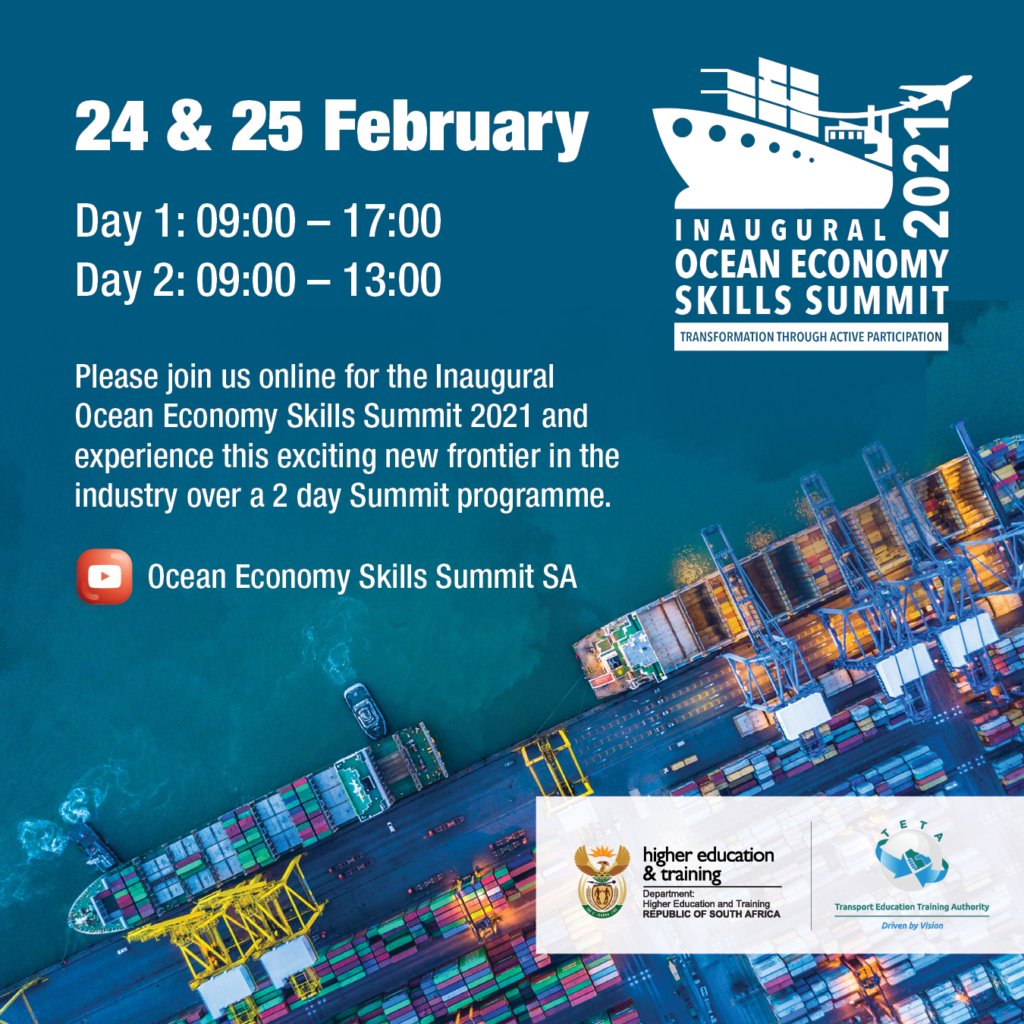The inaugural Ocean Economy Skills Summit 2021, the first of its kind in South Africa, will be held on 24 and 25 February 2021, at the Johannesburg Marriott Hotel Melrose Arch, under strict guidelines of Covid-19 regulations, connecting a hybrid audience of leaders and thinkers with a global audience on a digital platform. The summit is a collaborative effort between the Department of Higher Education and Training (DHET) and the Transport Education Training Authority (TETA), which are seeking innovative and meaningful ways of contributing to the growth of the ailing economy. This has become even more relevant particularly in light of President Cyril Ramaphosa’s recent State of the Nation Address, which highlighted a 6% contraction in the third quarter of 2020 compared to the last quarter of 2019.
The Ocean Economy Skills Summit 2021 is an excellent opportunity to not only unlock the potential of this sector but enhance multi-partner relationships and collectively deliver against the goals of the NDP 2030, which identifies the ocean economy as one of the industries that can contribute to unlocking the country’s economic growth, help eliminate poverty, and reduce unemployment.
Themed, “Transformation through active participation”, the transformational skills development programme of DHET and TETA is a great platform for all strategic partners, including government, institutions of learning, and the private sector, to strategise and redefine solutions on transforming the ocean economy through developing the requisite skills base.
The Ocean Economy Skills Summit 2021 will focus on:
- creating awareness and engendering interest in the blue economy, especially among previously excluded communities to participate meaningfully in the maritime industry;
- establishing a community of practice which consists of academics, industry partners and critical stakeholders to create a collective learning space to share knowledge;
- exploring the economics of the maritime industry and opportunities that exist to alleviate poverty through job creation and enterprise development;
- providing thought leadership in maritime skills development through research, dialogue and publications to contribute to the global maritime body of knowledge;
- creating capacity in the system for continuous professional development to deliver on the skills mandate; and
- exploring the role of education institutions in training, innovation, research and skills development.
Says Maphefo Anno-Frempong, TETA CEO: “We are excited to be at the heart of such a great initiative that aims to engage the industry as a whole and come out with tangible solutions to implement for the benefit of our country, economy and the youth. This initiative will expand our education sector. Basic education, CET colleges, TVET colleges, and universities will all benefit from new courses, new curricula and professional development. Cross-sector skills development and the transferable and exportable skills that stem from the growth of our ocean economy will also stimulate vastly diverse industries. I see the young learners of today, building the sustainable enterprises of tomorrow.”
Minister of Higher Education, Science and Technology Dr Blade Nzimande will deliver the keynote address and will be joined by a strong and vibrant community of partners from public, private, and educational institutions, who have been invited to impart their knowledge and views on fostering shared prosperity in South Africa and on the African continent.
Strategic partners and their representative speakers include: Transport Education Training Authority, Maphefo Anno-Frempong, CEO; Department of Transport, Zakhele Thwala, Deputy Director General: Civil Aviation; SA Navy, Rear Admiral Mbulaheni, South African Naval Staff Officer; SA Airforce, Major General Butler, Chief of Air Staff Governance; ARMSCOR, Professor NM Mkaza, Group Executive: Research and Development; Thandi Mehlo, Transnet National Port Authority, Programme Manager and Senior Marine Engineer; SA Navy Hydrographic Services, Captain (Navy) Theo Stokes, Hydrographer.
Other participating industry stakeholders include Bheka Zulu, Deputy Chairman of the South African Maritime Business Forum; Tshepiso Taoana-Mashiloane, Acting CEO at the South African Maritime Safety Authority (SAMSA); Sefale Montsi, Chairperson: Aerospace, Maritime and Defence; Thabo Bruce Fisha, Executive Chairman at FlyFofa Airways; and Patrick Ndlovu, Executive Chairman and Group CEO at Infinity Investments (Pty) Ltd.
This inaugural summit sets the tone for the achievement of the vision of creating a lasting African legacy within the ocean economy through skills development and entrepreneurship.
Website: www.oceaneconomyskillsnetwork.co.za
Official Hashtag: #OceanEconomySkillsSummit21 #OESS21

EDITOR’S NOTES
In 2012 the African Union (AU) adopted the 2050 African Integrated Maritime Strategy (2050 AIM Strategy), which aims at creating of economic wealth, building, and sustaining maritime capacity for the continent. On the other hand, SADC complements the AU maritime agenda in the Southern Region of Africa by driving the regional integration agenda through co-operating with other African regions.
South Africa has more than 3 000 km of coastline, the third longest of any African state, bordered by the Atlantic Ocean to the west and the Indian Ocean to the east. This ideal geopolitical position makes the country one of the world’s major strategic shipping routes.
South Africa’s commercial ports handle cargoes such as mineral bulk, break bulk, agricultural, containers, automotive and oil and gas. It is calculated that close to 80% of trade is done through the sea with an estimated annual traffic and activity of 30 000 vessels.
This makes the country the gateway into the national, regional, and international maritime trade. Thus, the country needs a robust domestic and foreign policy framework as well as capacity to explore and sustain economic development in the maritime space.
The economic opportunities for home-owned shipping fleets include job creation and attendant spin-offs for a wide range of other economic activities.